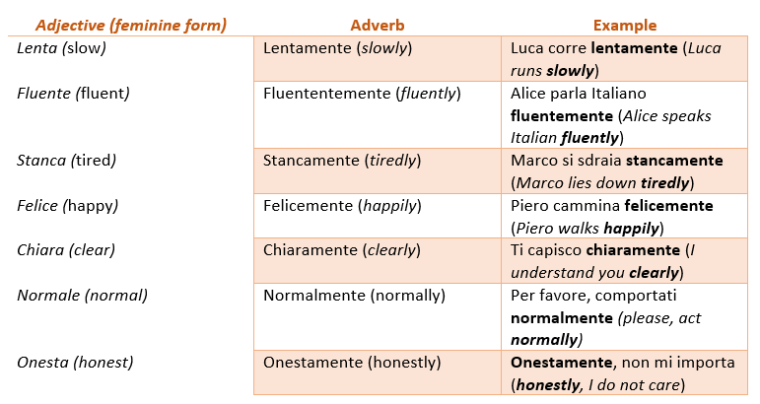An adverb (avverbio) is a word that modifies a verb, an adjective, or another adverb. This part of speech describes how actions are performed but can be used to change also the meaning of a noun or an adjective. In Italian, adverbs do not agree in gender and number with the word they are attached to. Thus, they are considered an invariable part of the sentence.
An adverb can be compared to an adjective, but instead it says something about a verb or an adjective instead of a noun.
See also our list of the top 100 Italian adverbs.
How to form Italian adverbs
Adverbs that come from Adjectives
While in English adverbs are formed by adding the suffix -ly to adjectives, many Italian adverbs are formed by adding the suffix -mente to the feminine form of an adjective (which usually ends with -a).

Simple Adverbs
Not all Italian adverbs are formed from adjectives. Usually, adverbs answers questions such as “how” (come), “when” (quando) and “where” (dove).
- Ronaldo gioca bene (Ronaldo plays well)
Study tip! Bene (well) is one of the most used Italian adverbs, used to say that someone is doing something well.
- Luisa è molto brava a pallavolo (Luisa is very good at volleyball)
- Lui corre troppo veloce (He runs too fast)
- Certamente lei verrà domani (She surely will come tomorrow)
- Andrò a dormire attorno le dieci (I will go to sleep around ten o’clock)
- Il cane è dietro la porta (the dog is behind the door)
- Ceniamo dopo la partita (let’s have dinner after the match)
- Mangiamo insieme! (let’s eat together!)
Interrogative Adverbs
In Italian, these adverbs are known as “question words”, and they are always used at the beginning of a sentence.
- Come (How)
- Come mai (How come)
- Quando (When)
- Perché (Why)
- Dove (Where)
- Di dove (From where)
- Quanto (How much/how many)
“One of the most important areas we can develop as professionals is competence in accessing and sharing knowledge”
To learn more about Italian language, ENROLL NOW to our Italian Course
How to use Italian adverbs
Remember that, as a general rule, adverbs directly follow the word they are modifying.
- Andrea balla male (Andrea dances badly)
However, in the context of a sentence, the adverb can go either at the beginning or at the end of the sentence. Interrogative adverbs such as “quando” (when) are always use at the beginning of the sentence.
- Aspetti ancora? (Are you still waiting?)
- Quando partirà il treno? (When is the train leaving?)
Remember that the adverb “già” (already) always goes before the verb.
- Ho già fatto i compiti (I have already done my homework)
Let’s test your ability!
Try to form the following Italian adverbs adding the right suffix.
Veloce ………….* (fast)
Libero ………….* (free)
Silenzioso ………….* (quiet)
Abile ………….* (capable)
Leggero ………….* (light)
Educato ………….* (polite)
Breve ………….* (short)
Answers at the bottom of this page.
*Velocemente
*Liberamente
*Silenziosamente
*Abilmente
*Leggermente
*Educatamente
*Brevemente
To learn more about Italian language, ENROLL NOW to our Italian Course

